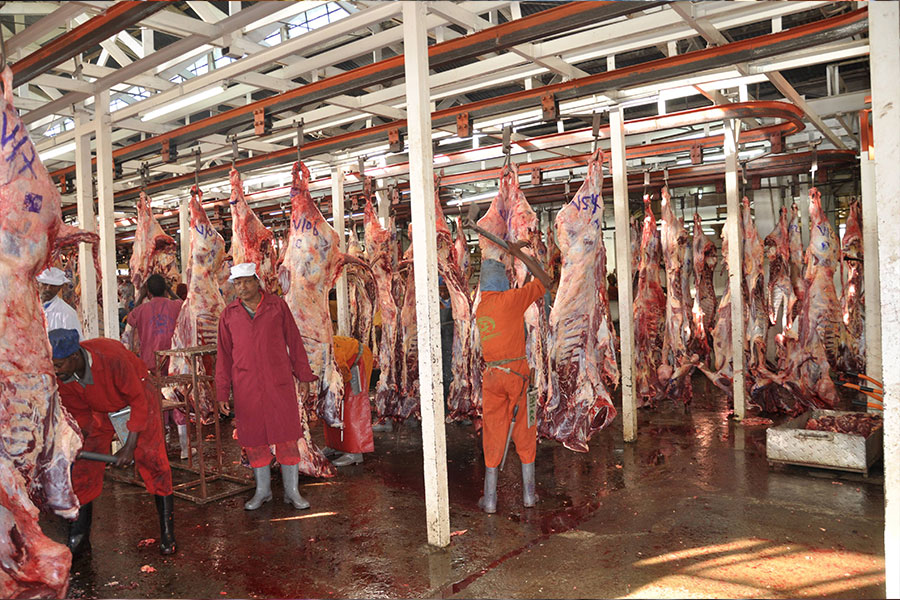
Radar | Aug 26,2023
As the central bank slashes foreign currency retention rates by half to 20pc, exporters are decrying the move as detrimental to their businesses and warn a fall in foreign exchange revenues is inevitable.
The majority (70pc) of forex earnings from exports, remittance and transfers to non-governmental organisations (NGOs) should be surrendered to the central bank, declared one of the two directives Central Bank Governor Yinager Dessie (PhD) signed off on January 6, 2022. Foreign account holders can only retain 20pc of their transfers in foreign currencies, and they should cede 10pc to the commercial banks.
Policymakers argue the amendment was prompted by their desire to encourage exporters and recipients of inward remittance. The exporters are fuming over the latest bout from the central bank, seeing it as further erosion of their earnings from 50pc. There was a time when exporters retained 70pc of their forex earnings to finance imports with widely high-profit margins. The recent adjustment is the third in about a year as the central bank continues to tinker with the foreign currency retention ratio between exporters, commercial banks and itself.
In March last year, the first significant change came about when regulators told exporters to surrender close to 70pc of their earnings to commercial banks and the central bank, repealing a directive issued two years ago. This, too, was a reverse to exporters' relatively unrestricted access to their foreign currency earnings. Nearly a third of their earnings was available indefinitely, and the balance was available for use within 28 days of deposit.
The authorities at the central bank saw this scheme manifesting in exporters using much of the available foreign currency, leaving none for banks to allocate to other sectors. They introduced a new rationing regime and allowed exporters to use retained forex to import their chosen items as long as they had the necessary permits.
Exporters are displeased.
The Ethiopian Horticultural Producer Exporters Association (EHPEA) is one of the lobby groups from export-focused industries that is apprehensive about the decision. Its leaders wrote a letter to the central bank voicing the misgivings of their members. They pleaded to the authorities to treat "producer-exporters" differently from other traders.
The Association represents over 100 members, many of them cut-flower growers and exporters demanding foreign currency to import inputs such as fertilisers, chemicals and packaging. Rarely available in the local market, these products represent 90pc of the inputs the cut-flower industry uses. Some also make periodical royalty fee payments in foreign currency for using patented flower breeds.
Sentayehu Kebede, general manager of Afriflora, a horticulture farm in Holeta town, Oromia Regional State, says the latest round of restrictions will make importing difficult and affect their business.
"The situation was at least manageable when the retention rate stood at 40pc," he said.
So are coffee exporters discontented with the latest set of rules from the central bank. It is an industry known to have its exporters sell on a thin margin – or even at a loss – to earn forex they use to import merchandise and recoup their losses from exports. Export revenues have surpassed 1.8 billion dollars over the first half of the fiscal year, with coffee accounting for nearly a third of the amount.
Fikadu Hailemariam, general manager of Homeland Organic Coffee Agro-Industry Plc, observed that many coffee exporters are in the business to benefit from the foreign currency earnings and not from the profit of the exported coffee.
"It [the ratio] should have increased," he said.
Coffee exporters have consultations with leaders of their respective lobby groups to voice their concerns collectively. Other lobby groups, such as the Ethiopian Meat Producer-Exporters Association and the Ethiopian Pulses, Oilseeds & Spices Processors Exporters Association, are to follow suit, according to people familiar with these groups.
Others involved in the forex chain are more optimistic about the new ratio. This includes commercial banks.
The central bank's decision should be understandable considering the country's import needs, argues Melaku Kebede, president of Hibret Bank.
“Considering the country’s huge deficit and scarcity of foreign currency, the measure is understandable,” he said.
Loans from external creditors have dwindled as grants from development partners are at an all-time low. Over the second quarter of the current fiscal year, Ethiopia received 250 million dollars in disbursement from loans and external aid, compared to 715 million dollars over the same period of the preceding year. A country that imports an average value of 16 billion dollars of merchandise sells no more than three billion dollars' worth of goods to the world. Foreign direct investment languishes at less than two billion dollars, the lowest in a decade. The annual average of four billion dollars in inward remittance is nowhere near filling the five billion dollar deficit in the balance of payments.
Adjusting the ratio of forex the central bank gets was necessary with the growing import bills for essential items such as petroleum, edible oil and wheat, according to Fikadu Digafe, vice governor and chief economist of the central bank.
The federal government spent half a billion dollars in the last quarter of the previous fiscal year importing petroleum products. It an expenditure representing over 130pc increase from the same period of the preceding year. The global oil price has gone up over the past few months, subjecting the government to higher foreign currency allocation.
"We understand the adjustment will have a negative impact on some sectors," Fikadu told Fortune. "But, it's the only option we have for now."
PUBLISHED ON
Jan 15,2022 [ VOL
22 , NO
1133]

Radar | Aug 26,2023

Fortune News | Apr 22,2022

Fortune News | Oct 23,2018

Commentaries | Aug 02,2025

Radar | Oct 30,2021

Radar | Dec 07,2019

Commentaries | May 15,2021

Radar | Aug 26,2023

Covid-19 | Mar 31,2020

Radar | Jun 11,2022

Dec 22 , 2024 . By TIZITA SHEWAFERAW
Charged with transforming colossal state-owned enterprises into modern and competitiv...

Aug 18 , 2024 . By AKSAH ITALO
Although predictable Yonas Zerihun's job in the ride-hailing service is not immune to...

Jul 28 , 2024 . By TIZITA SHEWAFERAW
Unhabitual, perhaps too many, Samuel Gebreyohannes, 38, used to occasionally enjoy a couple of beers at breakfast. However, he recently swit...

Jul 13 , 2024 . By AKSAH ITALO
Investors who rely on tractors, trucks, and field vehicles for commuting, transporting commodities, and f...

Nov 1 , 2025
The National Bank of Ethiopia (NBE) issued a statement two weeks ago that appeared to...

Oct 25 , 2025
The regulatory machinery is on overdrive. In only two years, no fewer than 35 new pro...

Oct 18 , 2025
The political establishment, notably the ruling party and its top brass, has become p...

Oct 11 , 2025
Ladislas Farago, a roving Associated Press (AP) correspondent, arrived in Ethiopia in...